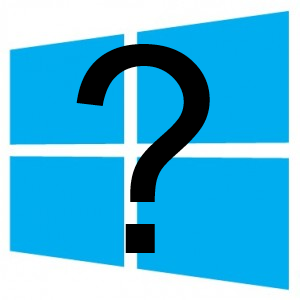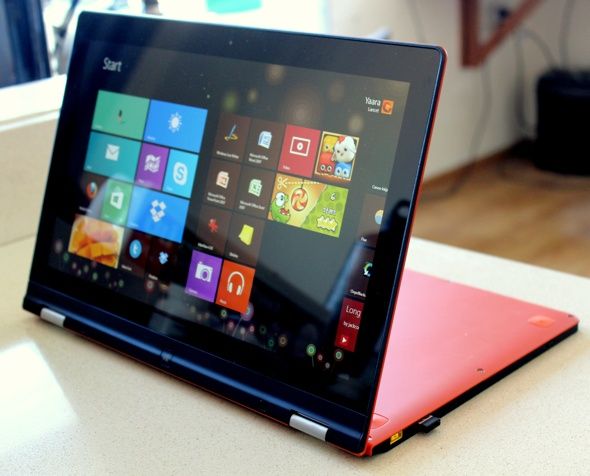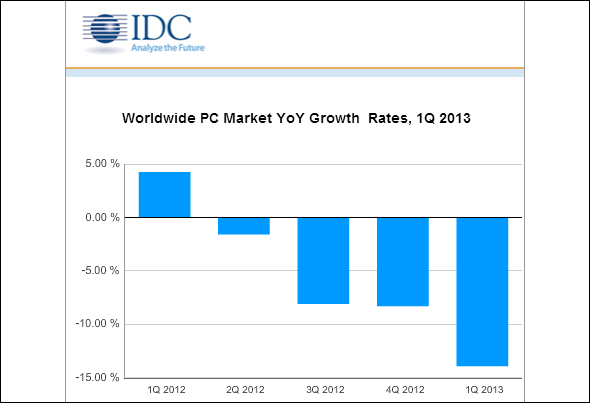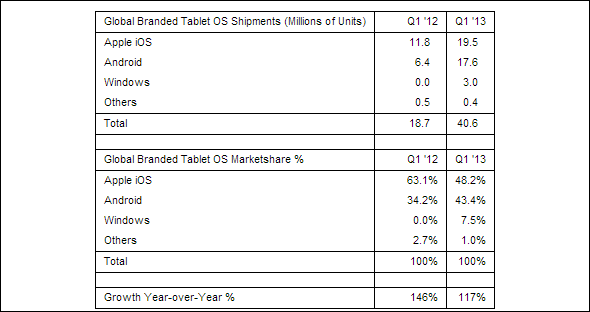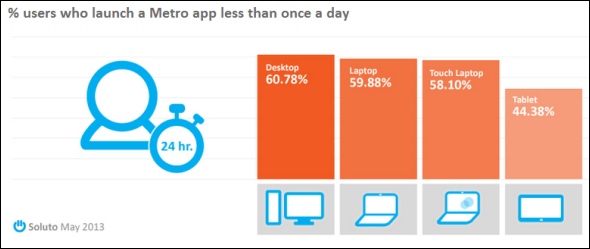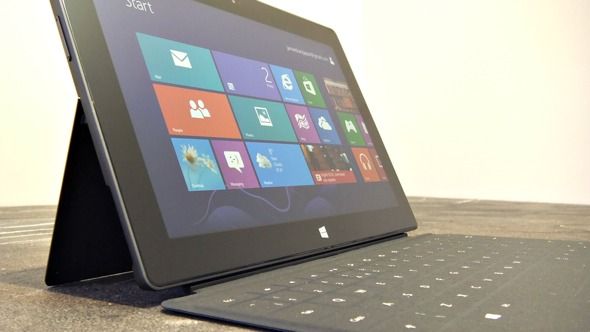Has Windows 8 failed? People who dislike Windows 8 generally say it is. But has Windows 8 really failed in the marketplace, or do we just think Windows 8 has failed? We'll try to look at some actual metrics and see whether Windows 8 has failed or not.
One thing's for sure: Windows 8 definitely hasn't succeeded in the short term. However, Microsoft is playing the long game with Windows 8 -- they're laying the groundwork for future success. Whether they'll succeed is unclear, but Windows 8 hasn't failed yet -- it's preparing for the battle to come.
Windows Sales
Microsoft sold over 100 million Windows 8 licenses in the first six months. That's actually just as many as the popular Windows 7 sold over its first six months, which seems like a good start.
However, Windows 7 eventually managed to sell 20 million licenses per month. As Paul Thurrot notes, 100 million Windows 8 licenses in the first six months is only 16.7 million licenses per month.
Windows 8 license sales were artificially propped up by the super-cheap upgrade offer -- $40 a copy for everyone or $15 a copy for people who recently bought a PC. After that offer ended, Windows 8 sales declined even further to 13.3 million per month. Windows 8 sales are below Windows 7 sales on average. However, Windows 8 isn't just for PCs -- as Microsoft tells us, Windows 8 is a "touch-first" operating system designed for tablets. Considering Windows 8 targets both tablets and traditional PCs, such low Windows license sales are definitely not a sign of success. Don't forget, you can learn a lot more about Windows 8 with our Windows 8 guide.
Still, by any metric, equaling Windows 7's success in the first six months is pretty good -- even if they had to use a limited-time offer and target both PCs and tablets to do it. Nevertheless, declining sales are not a good sign.
Also note that this statistic counts "Windows 8 licenses." A business that buys new Windows 8 computers and immediately downgrades them to Windows 7 will have their purchase count as a "Windows 8 license."
PC Sales
But what about Windows 8's effect on the overall PC market? IDC reported that worldwide PC shipments in the first quarter of 2013 decline by 13.9% compared to the same quarter in 2012. This is the steepest decline ever in a single quarter. PC sales have now declined for four quarters -- an entire year.
Is this Windows 8's fault? Everyone has their own opinion on this one. What is clear is that Windows 8 has failed to stop or even slow the decline -- for whatever reason, the decline of PC sales is accelerating. IDC's report states that "At this point, unfortunately, it seems clear that the Windows 8 launch not only failed to provide a positive boost to the PC market, but appears to have slowed the market." They note that the "radical" user interface changes have made PCs less attractive.
PC sales were already slowing in the run-up to Windows 8, so it's clear that PC sales would continue to decline as people are happy with their old PCs -- which are more than good enough -- and are spending more money and time on additional gadgets like tablets. However, Windows 8 was supposed to take those tablet-buying urges and redirect them to hybrid Windows 8 devices that were a mix of PC and tablet. This hasn't happened in very large numbers -- most people are buying iOS and Android tablets.
Tablet Sales
But forget PCs, how are Windows 8 tablets like the Microsoft Surface competing in the market against other tablets?
Windows 8 and Windows RT tablets became 7.5% of the global tablet market in the first quarter of 2013, according to Strategy Analytics. Microsoft and its partners shipped 3.4 million tablets worldwide.
With iPads at 48.2% of shipments and Android tablets at 43.4% of the market, Windows' showing at 7.5% is actually not too bad. Restricted Windows tablet shipments, trouble competing on price, no mini tablets, and limited tablet app selection hurt Windows in this category, but 7.5% is respectable and is something for Microsoft to build on. Windows 8 is certainly doing better on tablets than Windows 7 or "Windows XP Tablet PC Edition" did.
Windows 8's Vision and Windows Blue
But is Windows 8's vision a success? Steven Sinofsky, who drove the controversial decisions made in Windows 8, left Microsoft a few weeks after it was released -- it's unclear if he was just ready to move on or if this was a vote of non-confidence in his leadership.
Steven Sinofsky famously referred to Windows 8 as a "touch-first" operating system and defended his vision against critics. When people trying the prerelease noted that the integration between the new "Modern" environment and the desktop was clunky, he refused to make changes. When people began installing third-party Start menus and setting their computers to boot to the desktop, he doubled-down on his vision and tried to block Start menus and boot-to-desktop tricks. For the first time in Windows' long history, Microsoft began omitting options that let customers use Windows 8 the way they could use the previous version of Windows. Windows generally includes such legacy options -- Windows 8 even includes both a new backup system and the old Windows 7 backup system, just in case you prefer the older backup system and want to stick with it.
Microsoft is now striking a more conciliatory tone under the Windows division's new leadership, and word has it that Windows 8.1 (also known as Windows Blue) will include a Start button, a tutorial, and a boot-to-desktop feature -- all features Steven Sinofsky blocked as unnecessary and contrary to the Windows 8 vision. Microsoft recently released a "Windows 8 End User Training Brochure" that can be downloaded as a PDF file online. Microsoft took over six months from Windows 8's release date to release this, which just goes to show that they didn't accept the need for training users when Windows 8 was released.
The Windows 8 vision was clearly for average users to use Modern apps on every type of computer -- which is why the Start screen can't be bypassed without unofficial hacks that Microsoft tried to stop -- and the evidence on this front is not very good. A recent study by Soluto revealed that most Windows 8 users don't use Modern apps. The secret to happiness with Windows 8 on a traditional desktop or laptop is to avoid all the new Modern stuff and just use the desktop.
It's clear that Windows 8's uncompromising vision has failed. Microsoft says it's listing to customers by adding a Start button and boot-to-desktop option, but these same customers were ignored during Windows 8's development.
Has Windows 8 Failed?
In the first few months, Windows 8 sold as many copies as Windows 7 did -- but Windows 8 had a huge promotion, while Windows 7 didn't. Windows 8 has presided over an accelerating decline in the PC market, but it was sliding anyway -- still, Windows 8 didn't stop or even slow the decline. Microsoft landed a decent little chunk of tablet sales, but they're still way behind because of their late start. Microsoft is waving the white flag with Windows Blue and will be making changes, but these just amount to some tinkering around the edges.
So has Windows 8 failed? Well, it certainly hasn't been a rousing success -- the best that can be said about the PC market is that it was already in a free fall and Windows 8 just failed to have any impact, which is a backhanded compliment.
Microsoft's Vision of the Future
Microsoft is playing the long game with Windows 8. Intel's new Haswell chips will bring more power-efficient laptops with better graphics, allowing Intel-based Windows hybrid PCs to better compete against ARM tablets. Pricing will come down and you'll be able to purchase a hybrid laptop-plus-tablet for less than the price of an iPad. Microsoft will allow mini tablets to compete with the iPad Mini, Kindle Fire, and Nexus 7. Most PCs will eventually ship with touch features and this will encourage app developers to take Windows more seriously, developing more Modern apps and turning most Windows laptops into Windows tablets, too.
That's Microsoft's vision, anyway. They'll face resistance from Google and Apple -- rumors are already going around that Intel will be working on cheap Android laptops, of all things. Apple will likely continue championing their vision of separate devices, but they may introduce some sort of hybrid iPad/Macbook Air if the market appears to be headed in that direction. Sure, Apple says they'll never do that -- but they also said they'd never sell a mini tablet, create an eBook store, or develop a phone. Apple always says they'll never do something until they do it.
Windows 8 may appear to have failed in the short term, but in the long term Microsoft may succeed in capturing the tablet market as well as the PC market. Whatever the case, Windows 8 hasn't failed yet -- Microsoft is counting on new hardware to push their vision, so we'll have to wait and see.
What do you think about Windows 8? Do you think it will succeed in the long term, or will Microsoft fail to gain enough traction?

